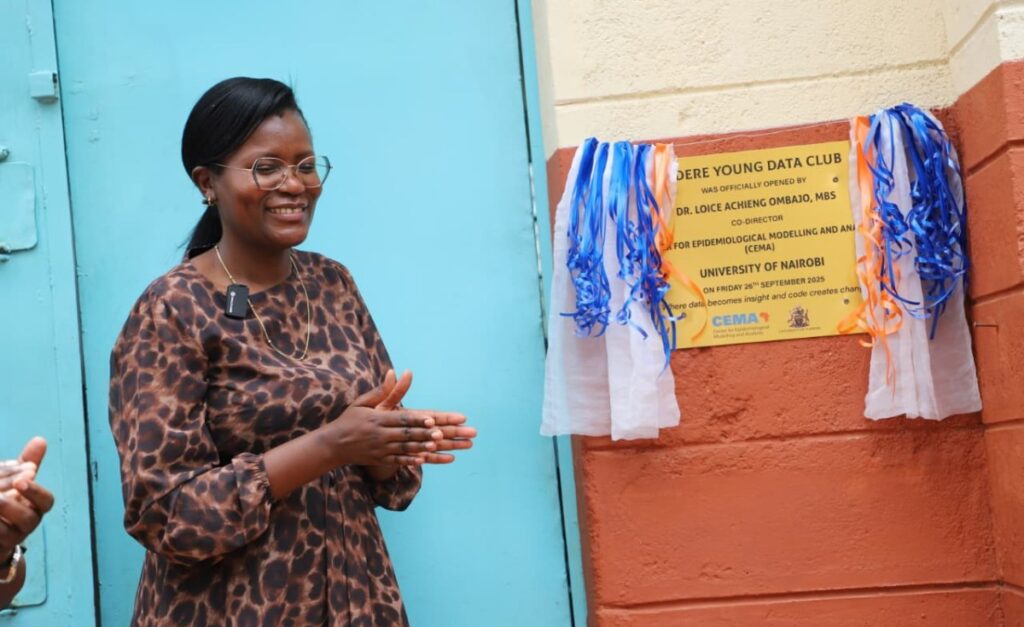At the heart of Siaya County, lies a transformative initiative that is opening new possibilities for young learners. On Friday, 26th September 2025, the Center for Epidemiological Modelling and Analysis (CEMA) within the University of Nairobi, officially opened a Data Club at Ndere Mixed School in Gem Sub-County. This innovative program aims to inspire curiosity, nurture ambition, and equip students with digital and data literacy skills that extend beyond the classroom.
Africa remains behind in data analysis and interpretation capability. Often, external actors lead data work and decision-making—leaving behind local perspectives and relevance. This initiative seeks to flip this narrative by empowering the next generation to understand and utilize data to shape their own futures.
“Decisions must be based on something—and the best ones are driven by data,” said Dr. Loice Ombajo, infectious disease specialist and Co-Director at CEMA. “We’re committed to building the next generation of African experts in data analytics. This initiative is a foundational step toward ensuring informed decision-making is embedded at the community level.”
Ndere Mixed School was chosen out of necessity: limited resources and low academic performance have held back students for decades. Located in a rural, poverty-stricken area, the school previously had only one 20-year-old computer shared among the administrative team. Students had very little exposure to computer tools, with an average school performance of a D+.
Keep up with the latest headlines on WhatsApp | LinkedIn
“Today marks a turning point for Ndere Mixed School,” said Mr. Bernard Otieno, Principal at Ndere Mixed School. “For years, our students have worked hard despite limited resources, and for most of them, this is their very first interaction with a computer. This data club is giving them a chance to dream bigger, to see possibilities beyond the boundaries of our village.”
“We are already seeing changes–students are more motivated, performance is improving, and they are eager to come to school early just to be part of the club. They are not only learning computer skills, but also responsibility, teamwork, and confidence. This initiative has lifted the morale of both students and teachers,” Mr Otieno added.
To turn the tide, CEMA renovated a classroom, converted it to a computer lab, and donated 10 brand-new computers. The data club now has its learning space in the lab. In rural areas where poverty limits opportunity, young people often become trapped in cycles of hardship—most of them settling for low-paying casual jobs or early marriage. This initiative aims to break that cycle by equipping students with the skills and confidence to dream bigger.
“Before the Data Club launch, we faced many challenges, including limited IT personnel. Now, this initiative not only creates future job opportunities but also reduces insecurity by keeping students engaged and exposed to new possibilities,” says Collins Omondi, Parent representative.
Entry is merit-based: students must show consistent academic improvement (no matter where they start from) to maintain their place in the club—adding motivation for excellence.
“As the school board, we pledge to safeguard this facility, support our teachers, and ensure this investment benefits generations of learners. We urge students to use the Data Club not only for their own growth but also for the growth of our community,” said Japheth Ochieng, Chairman of the Ndere School Board.
Currently, students are being trained in basic computer literacy—writing documents, attendance tracking, and managing digital files. Students themselves proposed an early start: arriving at school by 6:45 AM, earlier than the regular classes begin, to maximize the Data Club experience. The club currently has 20–40 active members, with plans to scale to other schools in the region.
The initiative is not a “touch and go” but a long-term commitment intended to show students that a brighter future is within reach for them, equipping them with a competitive edge in today’s digital era.
“Students are already learning how to ask thoughtful research questions and collect data from their communities—many even spent their recent holidays doing data collection activities.”
This initiative marks an important first step toward leveraging technology and data to unlock opportunities for underserved students and cultivate a new generation of bright, inspired young minds.
“This is more than a computer lab. It’s a space of opportunity, where data can be a force of empowerment—and where tomorrow’s leaders take their first step.” Dr. Ombajo concluded.


